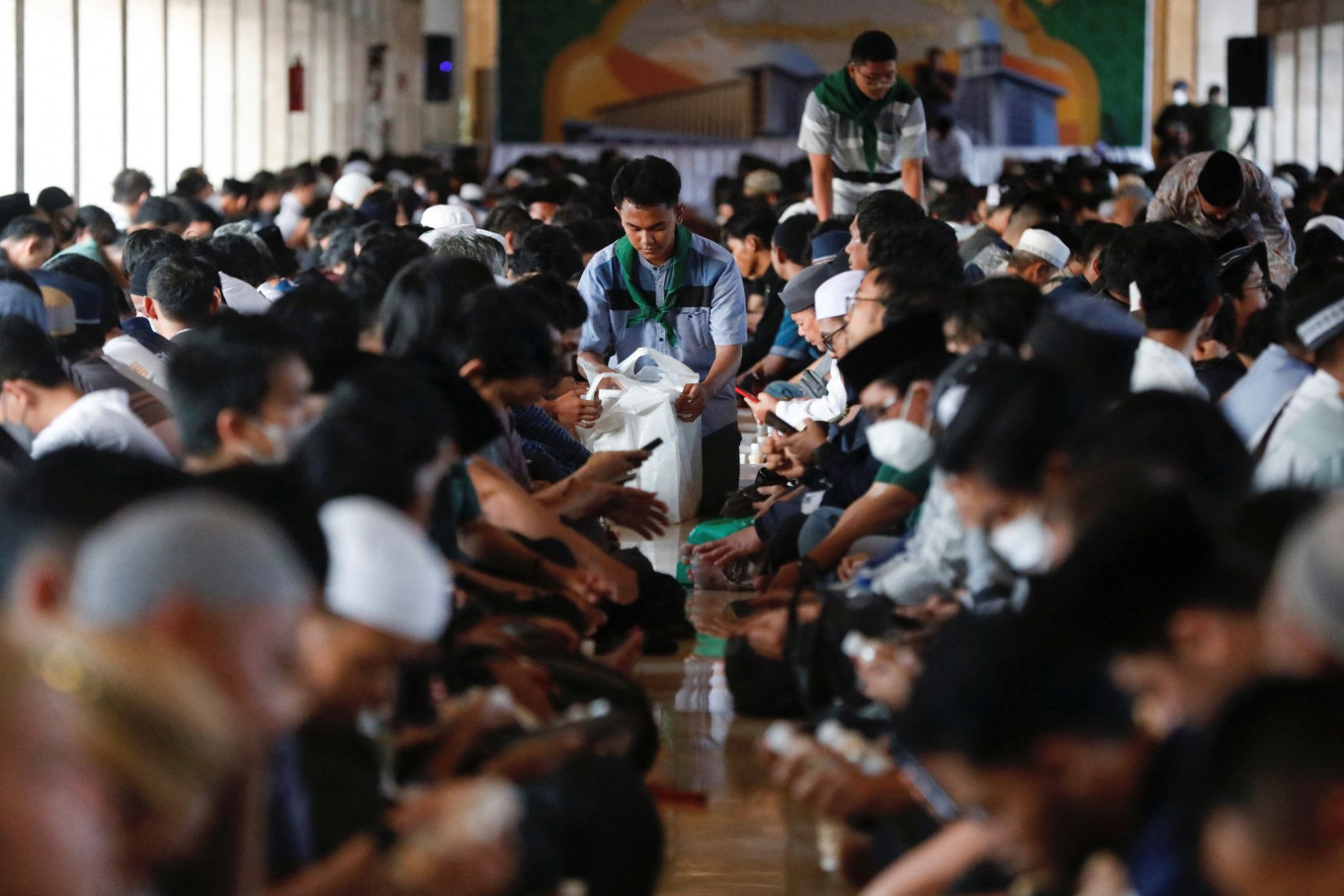Popular Reads
Top Results
Can't find what you're looking for?
View all search resultsPopular Reads
Top Results
Can't find what you're looking for?
View all search resultsOfficials clarify, defend iftar ban amid public outcry
Change text size
Gift Premium Articles
to Anyone
G
overnment officials have clarified and defended a presidential ban on iftar, breaking-of-the-fast, gatherings for civil servants during the holy month of Ramadan that has sparked public outcry and fueled anti-government sentiment among Islamic groups.
On Tuesday, two days before the start of Ramadan, President Joko "Jokowi" Widodo issued a circular banning government employees from holding iftar dinners, saying that the move was necessary as the country was still transitioning from the pandemic to an endemic COVID-19 situation.
In a statement on Thursday evening, Cabinet Secretary Pramono Agung clarified that the directive did not apply to the public and was only for coordinating ministers, ministers and heads of government agencies.
Pramono defended the policy saying that President Jokowi came up with the new directive after considering the recent barrage of criticism directed toward government officials who have displayed their allegedly ill-gotten wealth on social media.
“Government officials are currently under a glaring spotlight [for lavish lifestyles], hence the President asked government officials to hold breaking-of-the-fast gatherings in a modest way, not inviting any high-ranking officials when they hold the event,” Pramono said in a statement published on the YouTube channel of the State Secretariat.
Pramono was referring to the ongoing crackdown on lavish displays of wealth by tax officials. An assault allegedly perpetrated in late February by the wealth-flashing son of a mid-level tax official has renewed debate about the sources of wealth of some of the country’s highest-paid civil servants, and stirred calls among netizens to boycott the filing of income tax.
The iftar directive however has drawn criticism from Islamic groups, which have accused the President of being biased against the Muslim community.
Some have pointed out that the pandemic curbs were gradually eased until they were fully lifted at the end of December, and that events that draw big crowds, like concerts, exhibitions and even big weddings, including that of Jokowi’s son, have taken place.
Yahya Cholil Staquf, chairman of the country’s largest Muslim organization Nahdlatul Ulama (NU), has defended the ban on gatherings, saying that Muslims do not need to host large festive events to break their fast.
“It’s more important to share iftar meals with the poor or with people who are stuck in traffic jams. There's no need to make it seem like we're going to a big dinner party,” Yahya said.
During the month of Ramadan, which this year falls from March 22 to April 21, Indonesian Muslims from all walks of life typically gather to eat together after fasting from sunrise to sundown.
Often these gatherings attended by high-ranking officials at private homes or official residences, include expensive catering from hotels, on-site food preparation stations and entertainment options like karaoke.
Religious Affairs Minister Yaqut Cholil Qoumas also refuted accusations that President Jokowi was discriminating against the Muslim community on Friday. “President Jokowi has great sympathy for Islam [and] Muslims,” he said.
Yaqut, who also chairs the NU’s youth wing GP Ansor and is a younger brother of Yahya Cholil Staquf, said that it would direct the Religious Affairs Ministry’s staff to avoid hosting group iftar sessions during Ramadan.
By Friday, other ministries seemed to be observing the new directives. The Home Ministry, for example, has drafted a circular forwarding the President's instruction to regional government officials and plans to impose sanctions on officials defying the ban.
"The sanctions will be in accordance with the regulations in force at the Administrative and Bureaucratic Reform Ministry," Home Ministry spokesperson Benni Irwan said on Friday, as quoted by Tempo.
Administrative and Bureaucratic Reform Minister Abdullah Azwar Anas said on Friday that the new directive barring government officials from holding iftar events was mandatory for all civil servants and that he would enforce the ban with no exception.
Regional leaders, such as acting Jakarta governor Heru Budi Hartono and Central Java Governor Ganjar Pranowo, have thrown their support behind the iftar ban, saying that they would forward Jokowi’s instruction to staff within their administrations.
"I think in today's context, I agree with the directive. Moreover, in recent days we’ve heard stories of [public officials] flaunting [their lavish lifestyles]. Hopefully [we can] hold a simple breaking-of-the-fast dinner with family. There should be no elements of flaunting one’s wealth," said Ganjar, who like Jokowi is a member of the Indonesian Democratic Party of Struggle (PDI-P).









